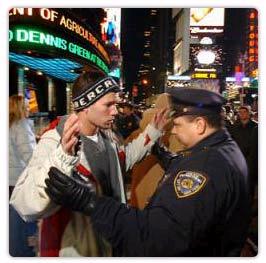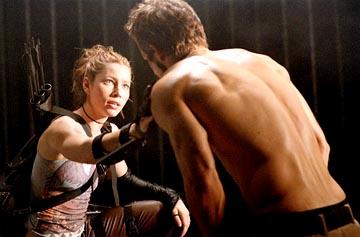Robot-on-the-Spot: This Bud's For You
Amy's Robot operatives have discovered an intriguing new development in the Bud vs. Miller controversy.

We won't identify this bar, lest their Miller distributor shuts them down.
« November 2004 | Main | January 2005 »
Amy's Robot operatives have discovered an intriguing new development in the Bud vs. Miller controversy.

We won't identify this bar, lest their Miller distributor shuts them down.

The throngs of tourists that have spent the last week clogging midtown, standing in line to get into the American Girl Store or to look at the damn tree in Rockefeller Center, and all shoving to get through a single set of subway doors at the 49th Street station (it's a long train with many doors, people!) are getting ready to converge on what might be the most anxiety-provoking place in the universe at midnight on New Year's Eve: Times Square. Get ready for a night of repeated frisking!
To celebrate the 100th anniversary of the traditional Times Square overcrowding, the Post published a list of 100 interesting facts about the history of the event. A few notable ones:
1. Before Times Square, New Yorkers rang in the new year at Trinity Church by shaking tin cans with bricks inside them.
3. Until 1995, the ball was lowered manually, by six men and a guy with a stopwatch.
18. In 1943 and '44, there was no ball, for fear it could prompt an enemy strike.
21. The ball wasn't always a ball. For five years in the '80s — the height of the "I love NY" campaign — it was an apple.
22. It was the same ball — with a green stem pasted on the top. It turned back into a ball in 1987. [Remember, NY in the 1980's wasn't doing so hot]
24. The actual symbol of a ball dropping to signal the passage of time dates back to 1833 when a time-ball was installed atop England's Royal Observatory at Greenwich.
31. In the late '90s, someone suggested the crowd dance to "YMCA" to entertain themselves. Police said no. [Too bad--this might have been the biggest collectively gay moment in our nation's history]
32. In the 1990s, various corporate logos were suggested in place of the ball.
33. They included a giant Bayer Aspirin bottle and a Pepsi can. [This year's suggestions include a White Castle slider, Tara Reid's breast implants, and Al Goldstein.]
43. Public drinking was prohibited at the celebration after Mayor Giuliani took office.
44. New Year's cleanups got easier after that.
47. In 1996, the first guest invited to flip the switch was Oseola McCarty, a poor, Mississippi laundress who donated her entire life savings — $150,000 — to a scholarship fund.
59. In 1980, the ball went dark from 11:58 to 11:59 p.m., to honor hostages in Iran.
60. This year, more than 2,000 pounds of multicolored, fire-proof confetti will drop from six rooftops.
61. Confetti Master Treb Heining supervises six volunteers to drop it. [Treb Heining might have the best job title ever]
65. This year's special guest: Secretary of State Colin Powell. [Powell, as Low Culture points out, already has some experience with dropping the ball]
72. Ten to 15 minutes after the ball drops, 38 sanitation workers start picking up every drop of confetti.
74. Viewership of the televised event seems to increase during times of crisis.
84. The crowd at that first post-9/11 New Year's Eve was the most polite ever.
85. The most raucous revelers were in the early '70s. [A few anecdotes related to these revelers would have made for a much more interesting list, Post writers]
94. Recent celebrations generated about 57 tons of litter per night.
And a few observations of our own:
1. If you are in the midtown area and want to escape before the real craziness starts, get on the subway before 4 pm, or you'll never get out of there.
2. Warmer weather means more drunk people out on the street longer. This year, New Year's Eve is expected to be a very mild night. Expect a lot of puke mixed in with the confetti, sanitation workers.

I suppose it's fitting that Jerry Orbach would die in such a quiet way, with no build-up, no hype, and little warning. The announcement of his death today is a lot like the way he left Law & Order after 12 years on the show. He pretty much just gathered his stuff together and walked out the door one day.
Note that before his TV career, Orbach was a veteran of the stage, having starred in the original productions of Chicago on Broadway and The Fantasticks off-Broadway, among others.
Here's a shot of him appearing on Celebrity Jeopardy.
[sniff] He was one of the good ones.

Faced with the horror of 44,000 people dead, millions more displaced and homeless, villages destroyed, survivors at risk of epidemics of disease, the shaky economies of poor nations blasted, and the fresh water supplies of many islands potentially ruined by salt water contamination, is there any way that our media can still work in a story featuring some pictures of a foxy girl in a hot little outfit?
Why yes! Yes there is.
ABOVE: Non-supermodel Sri Lankan women walk the catwalk of despair.
In this week's Village Voice there is a pair of interesting and self-indulgent pity pieces entitled "Generation Debt: The New Economics of Being Young", about how much it sucks to be:
a) a young woman, with changing expectations regarding the balance of career, personal development, marriage, and family, especially when we still make 76 cents to the male dollar, goddammit. And going to college was fun, but it didn't help us get a good job and now we're in massive debt and if we get ever divorced we'll end up in poverty. And,
b) a young man, with all that debt from college when we idiotically signed up for credit cards and blew all the money we didn't have on CDs and beer, and now we don't know if we'll ever be able to pay it all back, let alone buy a house, and HELL no we have no plans to get married because debt is emasculating. And man, college sure was a waste of time and money.
There is also a good but depressing follow-up about parents, who look on their children's financial situations with horror and despair. And offer a few brief comments along the lines of "Do you have any idea how hard we worked to save money to pay for college for you?!"
Yes, we're pretty much all poor and indebted, which is determining our major life choices. If you're going to a household for Christmas this week at which you will be asked about your future/job/marriage/children/declining ability to buy any presents for your family members at all, you might want to read these pieces and get your cultural and economic explanations ready.
And if you are at the stage of your life where you are considering where to attend college, and if you will be paying for most of it yourself, may I suggest selecting a public university.
Now that so many formerly communist nations have joined the EU and embraced consumerism, many of these households are finding out what Christmas in capitalist countries is all about: accumulating debt. While credit card companies describe eastern and central Europe as "virgin territory with a large potential for growth", Hungary's largest bank expects that household debt as a percentage of GDP could double in the next 5 years across the region.
Stores in Poland and Romania liberally offer shoppers personal credit, charging hefty commissions on their loans. The Czech Republic calls their popular new gigantic new supermarkets "hypermarkets", perhaps a reflection of the frenzied state of shoppers, free to borrow and spend like they yearned to do while under communist oppression. The article reports, "The new mores are light years from the philosophy prevailing under the communist system -- when consumption was constrained by the scarcity of products, meager salaries and a lack of loans."
So enjoy your portable DVD players and new leather furniture sets this Christmas, eastern Europe! While you're reveling in the holiday spirit, remember the true meaning of capitalism: a 21.99% APR.

One song has emerged from history as the go-to track to use in your movie's soundtrack to suggest '70's pop kitsch, and that song is "Afternoon Delight" by the Starland Vocal Band. The song's writers (who also co-wrote "Take Me Home, Country Roads" with John Denver) say they are enjoying their 1976 tune's renaissance, even if it is always used as a joke. Let's review the song's appearances:
Last night's use of "Afternoon Delight" was part of a very structured set-up that didn't just rely on the existence of this song for the laugh, but still, I think it's time to move onto a different '70's pop song for these kinds of jokes.

In browsing around viewers' comments and some reviews of Wes Anderson's new movie, The Life Aquatic with Steve Zissou, I've noticed a trend in the negative reactions the movie is getting. A lot of critics' reviews have been positive (examples include the New York Times review by A.O. Scott, who doesn't usually like narrative meandering, and Underground Online) but I see references to the movie's lack of narrative structure over and over again, mostly from regular viewers. Comments about Anderson being a good set designer*, but not a good storyteller come up often. He also gets called "precious" a lot. My own personal least favorite film reviewer ever, Richard Roeper (aka Ebert's monkey-boy), says "This is one of the most irritating, self-conscious and smug films of the year, working neither as a dark comedy nor a character study."
Well, I have to speak up. I know that apart from a few lucky folks who got access to a preview, no one has seen this movie yet outside of New York and LA, but that's OK. I will concede that The Life Aquatic is probably not Wes Anderson's best movie: there are a few story tangents that don't go anywhere or contribute much to the overall feel of the movie, and in some scenes the actors are wooden. It is a very stylized movie, and self-conscious in its depiction of how movies are made; many scenes are about Steve Zissou's crew creating his series of documentary films. Not everybody likes these kinds of movies. But criticizing this movie, or any movie, because it doesn't do a good enough job of "telling a story" or maintaining a linear narrative with a clear beginning, middle, and end is like complaining that a Jackson Pollack painting is bad because it isn't a picture of anything identifiable. Or that a poem is bad because it doesn't rhyme.
Too much emphasis gets placed on a moviemaker's duty to tell the audience a story. As a friend suggested to me the other day, the concept of the "story" as the most important element of a movie is mostly a construct of big Hollywood studios. The story hooks in audiences, keeps them happily submerged in the reality of the movie for 100 minutes, and gives them a simple answer when their friends ask them what the movie was about. It's hard to say what The Life Aquatic is about, just like it's hard to say what all of Wes Anderson's other movies are about. The "story" is not the point of these movies. As the Underground Online reviewer writes, Anderson is committed to his vision, which each one of his movies clearly has. He writes, "Anderson may have more insight into the human condition than any other director working today. Our determination to protect and hide our feelings at any cost, our selfishness, our jealousies and our capability for overwhelming love - Anderson has explored and brilliantly presented - without judgment - all of these human traits in all of his films."
If you read a modernist poem, or look at a painting by Mark Rothko, it's often better not to try to figure out what each word is intended to symbolize or what the painting is depicting, but instead just let the overall impression of the work wash over you. I think Wes Anderson movies can be like that: a bunch of weird little moments that add up to something bigger than the pieces. Which is strange in the case of The Life Aquatic, because the movie is actually very structured, with numbered subject headings announcing each new episodic scene. Despite this, the movie does not follow any traditional narrative structure, and if you look for one, you'll probably be confused, and come out saying that Wes Anderson doesn't know how to tell a story.
But a few scenes in which not much actually happens (like the one in which Bill Murray walks along the long deck of the ship, lighting a cigarette, while "Life On Mars?" plays on the soundtrack) are the most successful moments of the movie, and left me with that warm, glowing fondness for humanity that Anderson's movies generally produce. If you want to have a story told to you, call your mom and ask her to tuck you in with a nice children's book. Otherwise, go see movies like this one.
*As an aside, the Cinecitta sets in this movie are just as stylized and awesome as you would hope for.

Excellent piece in the Times today about the NYPD gun of yesteryear, the .38, also known as a six-shooter. Common models still carried by older NYPD officers include the Smith & Wesson Model 10 or the Ruger Police Service Six. The article notes these guns are now "more commonly seen on T. J. Hooker reruns or film noir than on the streets of New York."
These revolvers were NYPD standard issue until 1993, when semi-automatics were brought in to arm cops with the same guns that criminals had. After that year, rookies were given the new guns, while existing officers could keep their old revolvers if they wanted to. These days the older guns tend to be carried by old-timers, cops who have been around the block a few times, and now they serve as an identification with an earlier era: a time "when guns were guns, and cops were cops," as a 41 year-old officer says. Even Police Commissioner Raymond Kelly still carries his Colt Detective Special revolver, strapped to his left ankle, according to the article.
As the Times writer says, the cops who carry their old .38s are the guys who married their high school sweethearts. Here are a few of their comments on why they keep the old guns:
"They say, 'What are you, an old-timer?'" said Officer Mark Steinhauer, 41. "My answer to them is, 'It worked for John Wayne.'"
Officer Melita joined in 1986 and patrolled in Harlem for 18 years. He believes his gun shows younger officers that he was at work when times were different in New York. "That's how you can tell who's been on the job awhile," he said. "Back when it was, you know, wild."
Perhaps inspired by the Bernie Kerik scandal involving his illegal Mexican nanny, the UK has stirred up its own version: David Blunkett, the Home Secretary, just resigned after admitting he used his office to expedite the visa processing for a Filipina nanny. A nanny for the child he had with his married ex-lover, no less. Much like the job Kerik was nominated for, Blunkett was in charge of his country's security, law enforcement, and immigration.
This guy hasn't been doing well in the public eye for the last few months, since his affair and child were discovered. At the end of the AP piece, they include a bizarre anecdote demonstrating his crumbling mental state: "Blunkett showed signs of feeling the pressure — using a back door to leave his home Wednesday to avoid reporters, and canceling plans to appear in the House of Commons Wednesday afternoon. He may not have helped himself by turning up at a Christmas party and singing a Fred Astaire-Ginger Rogers duet, 'Pick yourself up, dust yourself off, start all over again.' News reports said the song bombed, and Blunkett quickly departed."
He also looks terrible in the picture. Get some rest, fella.
Amy's Robot hasn't discussed the Scott Peterson trial, largely because we found the whole circus exploitative and sad. But we felt it necessary to comment on this touching article [Legal Superstar Stung By Peterson Defeat] pointed out by ADM, on the real victim of the whole tragedy. We are speaking, of course, about defense lawyer to the stars Mark Geragos.
It's been a rough year for Geragos, once the go-to guy for high-profile characters who got busted shoplifting or misplaced their interns. But that was before a cold-hearted jury found his star client guilty and sentenced him to death - with total disregard for Geragos' career!
To paraphrase ADM, give me a fucking break. This article, which suggests that the jury did something wrong by finding a murderer guilty, outlines just about everything that's wrong with the media sensationalism around these cases.
"I don't think it gets any worse than this, losing a death penalty case in such a public way," said trial watcher and Loyola Law School Professor Laurie Levenson.
You know what, Laurie? I bet Laci Peterson's family thinks it gets a lot worse. In fact, I bet they think that having your daughter's death become a public spectacle, and then seeing her murderer featured on an E! True Hollywood Story and in People magazine, is much, much, worse.
The truly stupid part of this piece is that it almost accidentally points out that Geragos isn't such a hotshot after all. He wasn't able to get Winona Ryder off on her shoplifting charges, and he was fired by Michael Jackson. And when Michael Jackson fires you, it's probably time to take a good hard look at your career.
Geragos claims that he wanted to represent Scott Peterson out of a sense of moral obligation, because he felt the situation was becoming a "witch hunt". After all, his firm claims that "the law offices of Geragos & Geragos have always stood for one thing above all else: honesty and integrity in representation." Yes, enough honesty and integrity to post a piece yesterday written by a representative of a right-wing Christian organization* suggesting that a Satanist cult was somehow responsible for Laci Peterson's death. Witch hunt, indeed.
[tx ADM]
* The organization is Blessed Cause, which is opposed to teaching "Sex Ed Porn" in public schools, the ACLU, and "forcing children to pray to Allah". I'm not linking to it directly, but the web address is on the article link.
Oliver Stone to Turkey: "Hey guys, I'm really sorry about that Midnight Express screenplay I wrote. You don't really rape and torture your prisoners, OK? And that whole "nation of pigs" thing was way out of line, and anyway, that was in the original book. OK? Now go watch Alexander. You guys love the Greeks, right? Besides, no one in my own goddamn country will go see it."
Robert DeNiro to Italy: "Oh hi, Italians? Hey, I'm really sorry about all those harmful ethnic stereotypes I've been promoting for my entire career. You're not *really* all a bunch of greasy murderous thugs. And that Shark Tale thing? That was just a joke, you know, for the kids! OK? Now go see my dead father's art exhibit. And while you're at it, give me Italian citizenship. I'm proud of my heritage, and I deserve it! Capishe?"

"As a nation that values immigration, and depends on immigration, we should have immigration laws that work and make us proud. Yet today we do not. Instead, we see many employers turning to the illegal labor market. We see millions of hard-working men and women condemned to fear and insecurity in a massive, undocumented economy."
[President Bush Proposes New Temporary Worker Program]
"Bush did not say anything about the matter yesterday, but he teased reporters by cupping his hand to his ear as he walked across the White House's South Lawn to his helicopter, as if to invite a question. Asked whether he was upset about Kerik, the president smiled and cupped his hand to his ear again, even though he appeared to have heard the question."
[White House pins blame on Kerik]

"God, he's so sexy when he makes that kissy-face. Now that I've been nominated to be Secretary of Energy, maybe I can get a piece of that action."
Lots of good stuff today:

Blade: Trinity, which was released last night, is not the best of the Blade trilogy. For the first half-hour or so, it's not even what you would call "good", at least in the strictest sense of the word. Blade II was better; the writer/director of this latest installment used some of the same stylistic elements that Guillermo del Toro developed, including that freaky bifurcated-jaw thing, on some of the vampires. But the movie gets better as it goes along, and if you would rather have fun at the movies than watch something artistically stimulating, the overall not-greatness of it won't matter a bit.
But if your movie-viewing decisions rest on how gay a movie is, then run, don't walk. Blade: Trinity is the gayest vampire movie I've ever seen, and I say that in the most congratulatory way possible. All those lesbian vampire movies of the '60's and '70's are cool, but obvious. Blade requires you to use your imagination, at least a little bit.
Let's start with the king of homoeroticism, Ryan Reynolds (who we discussed earlier as the new, younger, and better cut version of Stephen Dorff.) I would argue that the entire subtext of the movie focuses on Ryan's character being gay. You know those guys that you might have known in high school or college who make a lot of jokes about being gay or being attracted to men, or acting effeminate? But they do it all the time, and the jokes aren't really that funny? But after they make these jokes, they laugh uproariously and are like "Dude, I'm just kidding!" even though you've already heard hundreds of similar jokes from them in the past? And then, usually, you find out 5-10 years later that, in fact, that guy has come out as being gay? Ryan Reynolds is like that. His character is the jokey, comedic center of the movie, and just as an example, here is his first joke in the movie: When Blade asks him how he bankrolls his vampire slaying operation, he says, "Well, I date a lot of rich guys." After quizzical looks from other cast members, he says he's just kidding. You had us for a second there, Ryan! And it just goes on from there. Some of his lines are funny, but many of them are irritating, as this type of joke tends to be.
These kinds of guys that I referenced earlier, the ones with the constant unfunny jokes about being gay, also tend to sound very strained and nonsensical when they talk about women, like they are constructing an artificial image of heterosexuality. When the Ryan Reynolds character makes mention of a woman he used to be involved with, he says she has "fangs in her vagina." Yeah, that guy loves the ladies! I mean, he is actually talking about a vampire in this scene, but still.
Interestingly, the subtext of Ryan Reynolds' character being gay might actually be about Ryan Reynolds himself being gay. On a recent appearance on Conan that ADM told me about, he made jokes of the same variety during the interview, when he wasn't even in character or anything. Jokes like this: "So I'd come home from the set every day and be like, 'Well, today I shot a full load in a guy's face!'" There are obviously a lot of different levels operating here, but I can't speculate on whether this is a case of the actor putting a lot of his own characteristics into a character, or the actor adopting the homoerotic undertones of the character he plays.
So then we come to Jessica Biel, who plays the other new vampire slayer. I think Jessica and the character played by Natasha Lyonne are lovers in the movie, and this seems to be suggested clearly enough that it's not even really subtext (just plain 'text'?). Also interesting is that there is zero sexual tension between the two young new vampire slayers (even in scenes like the one in the photo above.) How many action movies involve male and female co-stars in which there is zero hint of romantic involvement? There are none, unless you count action movies in which both the male and female co-stars are gay, like this one.
Aside from all the interesting gay slayers stuff, another good thing about the movie is Wesley Snipes, and his improving skills in delivering the one-liner. This used to be exclusively Kris Kristofferson's territory in the Blade series, but Wesley has obviously been working on his comedy skills.
The RZA did the original soundtrack, and it's very good. Though in any future installments I would recommend not using songs during montage scenes that actually include vocalists saying "Daywalker." It's just silly.

Something weird is going on over at Anheuser-Busch. It struck me this morning as I was sitting across from one of the Budweiser “Fresh Beer Tastes Better” posters currently plastering every single New York City subway car.
This campaign, launched last fall, has a curious logic behind it based on Anheuser-Busch’s own success (the company’s current market share is around 50%). It goes like this: beer tastes better if consumed less than 35 days after brewing – which is how long Bud generally sits on your retailer’s shelf. Other beers (such as, say, Miller) can spend up to twice as long in the store. Therefore, one should buy and consume Bud, both because it is fresher than other beers, and because by clearing the shelf you ensure a continuous, fresh supply of new beer. Tricky.
But then there was the King of Beers' bizarre “Unleash the Dawgs” campaign earlier this year responding to Miller’s “President of Beers” ads. Using third-grade tactics, Bud “unleashed the dawgs” by allegedly having distributors slap stickers on Miller Lite products saying “Queen of Carbs” and "Owned by South African Breweries" and running ads with similar messages. The campaign was pulled when Miller sued. [Both campaigns are fully documented here]
Simultaneously, Budweiser undermined their own position by anxiously reassuring carb-counting consumers that “all light beers are low in carbs – choose on taste.”
And now – now, there’s B-to-the-E™, or B(e) for short.

Just what is B(e)? Why, it’s a beer-based product infused with caffeine, guarana and ginseng, a direct response to the popularity of energy drinks like Red Bull (and an embarassing attempt to use youth language). If you’re looking for something lighter, Anheuser-Busch has also added Bacardi Silver Low Carb Green Apple to its Bacardi Silver family of brands. A pretty bold move for a company that just spent a tidy sum calling their competitor girly.
I think two things happened here. First, the Bud loyalists are getting older, and Anheuser-Busch began to envision a bleak future of dilettantes who jump from product to product, caring only about fads like carbs and caffeine. Then someone at Anheuser-Busch noticed that Miller’s global net profits more than doubled this year. And then everyone started freaking the heck out.
Bud is not my beer of choice, but I’ve always been impressed by the brand loyalty it inspires. Good or bad, you know exactly what you’re getting when you crack one open. I know plenty of people who would never consider drinking anything else. But the fastest way to destroy a strong brand is to start fiddling with it. Consumers can smell fear, and as soon as a product looks vulnerable, they’re gone. As Slate pointed out, a competitor as successful as Budweiser should have ignored the Miller ads. By responding, they looked fearful – and it seems pretty clear that they are.
Here's my advice, Bud, and you can have it for free. Drop DDB Worldwide, for starters. Let Red Bull and Miller Lite have their niches. Stick with what you do well. You don’t need to follow everyone else off the brand extension cliff.
But, sorry, I'm still not going to drink your beer.
England's The Observer ran a sloppy, surprisingly uninformative piece on the Gawker family of blogs the other day. (The story appears on the website of the Guardian and the Observer.) Not to quibble -- especially since I usually hate stuff like this -- but by the time I read the fourth obvious error/misstatement in the article, I thought someone should point out its many mistakes:
The article contains a few quotes that gain irony in this context:
Heh.
[story via fimoculous; concept via the Unabomber.]
Update: Gawker's Denton writes in to say:
...you missed the biggest mistake of all. Jessica, the writer profiled, is Coen, not Cohen.
And Jessica herself says:
Aside from also misspelling Jennifer Aniston's name, they misspelled MY last name a bazillion times. And I spelled it for them, in person. Oy. I can take it, but can Jennifer?
Note to travelers who passed through Charles de Gaulle airport this weekend: don't be alarmed if you open your suitcase at the hotel and find something unusual nestled in with your underpants, like, I don't know, maybe some plastic explosives.
French national police planted the missing explosives in some unsuspecting traveler's luggage as part of a training for bomb-sniffing dogs. One good dog successfully identified the bag, but a second, bad dog missed it, and before anyone could grab the bag - merde! It had disappeared down a conveyer belt, jetting off to parts unknown that could include Italy, Japan, Brazil, or the U.S.
This was Friday, and four days later they're still on the loose, despite the Pollyannish hopes of the French authorities: "We hope the person who finds this [in their luggage - ed] will take it to the local authorities...we hope they will not throw it away."
The plastic explosives, about the size of a cell phone, are powerful enough to blow the door off a car. In the wake of this "incident" the French police have decided to discontinue planting live explosives in people's luggage.
Is that some crazy shit, or what? Just what kind of government could make what the French Interior Minister is calling such a "totally reprehensible and scandalous" mistake?
If you're interested in the social dynamics of our consumer culture, you should take a look at the NY Times special section on shopping in today's paper. There's a great piece on the retail stores (like, not delis) that are open all night or very late in NYC, and the people who shop there; and one on the difficulties and underlying motivations that are involved with gift-giving. This being the Times, there is also a pointless article that reveals that some people do a lot of shopping online! And some women actually enjoy shopping - as a recreational activity!
The most interesting article is one about a neurological study that was done recently on some Japanese women, which examines the physical brain response related to brand loyalty. What they found is that for women who feel the strongest sense of loyalty to a particular store, their neurological activity when they think about that store is centered in areas of the brain that deal with visual memory and emotion. Particularly the amygdala, described as the "sensory gateway to the emotions." I'd be interested to see if men's brains indicate the same things about the source of their brand loyalty.
Marketers, of course, want to develop as many of these passionately loyal customers as possible, because these are the people who will go way out of their way to get to their preferred brand or store, they will tell their friends about it, and they will be very forgiving of any service lapses or product problems. I know that if everyone felt the way I do about ShiKai shower gel, you would be able to buy that stuff as easily as you can get a bottle of Coke: at supermarkets, gas stations, delis, and vending machines across the globe. The problem is that people develop this fanatical loyalty based on emotional response, not as a result of things that marketers can control, like advertising, or even exceptionally high quality products. It turns out that the best customers are irrational in their consumer behavior, so there's no clear way to manipulate their decision-making. It's hard to build a bigger base of loyal customers when their behavior makes no sense.
But focus groups are probably going to involve a lot more brain scanners in the years to come.
Clint Eastwood's latest self-indulgent movie, Million Dollar Baby, has one thing going for it that is sure to make it a billion times better than last year's Mystic River garbage: Hilary Swank. Specifically, the fact that she put on 20 pounds of muscle in preparing for this role, as she told Ellen DeGeneres on her show the other day. Look:

For anyone who has a big crush on Linda Hamilton in T2, this is very good news.

There has been much excited speculation lately on Ukraine opposition leader Viktor Yushchenko's "mystery ailment". In addition to causing the politician crippling pain, this disease has also delighted the international press by destroying what journalists insist on calling Yushchenko's "movie-star looks".
Many theories are being thrown around, including poison, bad sushi, and an unidentified immune disease. Yuschchenko's own specialists can do little more than list his symptoms: "He was severely ill, but this does not all add up to a single disease or even a known syndrome," said one doctor.
While this case may have stumped Europe's most illustrious physicians, the Amy's Robot Bureau of Rare Diseases has been able to identify Yushchenko's ailment as something very serious indeed: Robert Redford Syndrome.

Sadly, there is no known cure.

Much like the Joy Division album of the same name, Mike Nichols' new movie Closer has a beautiful surface (pretty people, sleek sets) and a deep, dark pit of gloom on the inside. The movie is a morbid rumination on human weakness and all the horrible and manipulative things we can do to each other. Dark stuff, sure, and sometimes it feels a little too stagy (the script was adapted from a play, and sometimes you can tell) but the structure is tight and the performances are surprisingly good.
You know who delivered one of the best performances of the movie? Julia Roberts (I know!) More than any of the other actors, and yes I'm looking at you, Natalie Portman, Julia Roberts communicates a sense of weary experience--she understands people and their inevitably painful romances, and while she's not too thrilled about going through another couple of rounds, she can't resist getting sucked in.
Natalie Portman, on the other hand, was miscast. If you're looking for someone to play a damaged girl who has seen too much of the world for her young age, yet is still hopeful in an immature kind of way, you probably should not cast squeaky-clean little Natalie Portman. She's the only child of a wealthy and protective doctor from Long Island, and it comes through too much in this movie. She comes across as a Harvard psych student trying to pretend she's a fucked up stripper who's seen it all, and it doesn't work. In the past, Natalie has rejected a lot of other roles that she thought were too perverse or morally questionable, and her instincts have been right--she just can't do those kinds of roles. Christina Ricci apparently has taken a number of her rejects (for example The Ice Storm.) I don't think Christina would have been the right person for this part either (ADM thinks possibly Julia Stiles?) Granted, this character is also probably the worst written of the four--many of the revelations about her that are supposed to be clever turn out to be predictable and uninteresting.
As always, Clive Owen is awesome. Remember how great and intense he was in The Bourne Identity, in which he had like 3 lines? The most difficult and least likeable role in the movie was given to Clive Owen, and without him playing it as well as he does, the movie would fall apart. He's just about the most talented actor around these days. He also has the ability, despite being very handsome, to look like a wild-eyed shambling disaster when he doesn't shave.
The heart-warming lesson to take away from this movie, after all the betrayals and cruelty and guilt, is this: if you cheat on your partner, just lie about it. Don't tell them. Also, London strip clubs apparently play the same Prodigy CD every night.
What happens when you spend your days getting screamed at? If you’re FCC chair Michael Powell, you write an op-ed in the New York Times, attempting to justify the recent fracas caused by your office. Powell fussily blames “those who make a handsome living by selling saucy fare” for creating most of the trouble (a clear jab at Howard Stern, who abused him on a recent radio call-in show). Powell also reaches right for the heartstrings with the most tired of all censorship arguments: of course he supports the First Amendment, but by God, he’s also a parent.
I wouldn’t make such a big deal out of this, but his conclusion struck a nerve:
“Berating citizens who believe in values and reasonable limits is insulting and polarizing and distracts from the legitimate issues of this policy debate. Critics of the law should instead focus their efforts on changing the law, if that's what they want.”
Oh, I see now. Instead of whining about the law, we should change it!
Does Michael Powell live in Fairyland? Does this man truly not know anything about the organization that he runs?
In one sense, Powell is absolutely right. The FCC “isn’t in the business of censorship”. They’re “in the business” of supporting business. The act that created the FCC also determined that radio would be funded through advertising, eliminating the possibility for educational and socially responsible programming. Since then, the FCC has been “in the business” of consolidating control of the American communications industry into six or eight conglomerates. And the American people have never, ever, had a voice in this process – except for the American people who sit on the boards of Viacom and NewsCorp, or belong to the National Association of Broadcasters. Changing the laws, as Powell so blithely suggests, would require a complete overhaul and revision of seventy years of business-friendly legislation, as well as going head to head with one of the most wealthy, powerful lobbies in this country. You want to talk about "legitimate issues of this policy debate"? Why don't you start there?
Powell can protest all he wants about the FCC not being a watchdog, but what he doesn’t seem to realize is that the organization has backed itself into that corner. Where did these “certain broadcasters” who “trade responsible restraint for torrid sensationalism in the relentless race for ratings” come from? They are a direct result of our government’s policies.
I’m not saying that the FCC is single-handedly responsible for creating all the garbage on television today, but they are certainly responsible for our lack of choices. If our airwaves were instead filled with a diversity of programming from a multitude of sources not dependent on advertising dollars, then Mr. and Mrs. Powell could just change the channel when they fear their children might be exposed to boobies, and stop scolding the rest of us for not wanting to lose the few freedoms we have left.
Today's Who'Dat™ features a celebrity who's looking less like herself these days and more like another, related celebrity. Extra points if you guess both.
Make your guess and click on the picture below to see if you're correct. The second answer appears after the jump.

Sometimes, the hard-hitting investigative journalists at Amy's Robot are called on to make tough decisions in bringing you the highest quality news in a timely fashion. For instance, when we hear that television stations in L.A. are refusing to air commercials featuring a 6-foot syphilis sore, we're faced with two competing instincts - thinking it's an elaborate media hoax, and wanting to slap it up on the 'bot immediately.
However, after some preliminary research, the story appears to be true. The Los Angeles County Department of Health Services and progressive ad agency Social Marketing created "Phil the Sore" in 2002 to raise awareness of the alarming resurgence of syphilis. Phil's many public appearances are documented on the "Stop the Sores" website, and he's also been featured on billboards and in print ads.
But seeing a big lumpy sore (even one who looks more like a California Raisin) at gay pride parades is quite different from seeing him on your television. The ad, in which Phil follows two men home from a club and then invites his buddies "brain damage", "rash" and "blindness" along, didn't go over so well with Los Angeles network affiliates living under the constant threat of FCC fines.
"We found it to be inappropriate for a broadcast audience," says a KCBS-TV Channel 2 spokesman, ominously adding: "We consider the prevention of sexually transmitted diseases to be a serious matter. It's an issue we have addressed and will continue to recognize through fair, accurate and balanced news reporting."
Los Angeles county public health director Dr. Jonathan Fielding counters: "My question would be, 'Is this content more "adult" than others that are being shown … in the evening hours?' "
Yes and no, Dr. Fielding. The difference is clearly that the DHS ad addresses and raises consciousness about a serious health issue. And all good Americans know adult situations are meant for entertainment purposes only! We sure like to see sex on the tv - just not the consequences of it.
But in the time-honored tradition of "any publicity is good publicity", Phil's spot may end up being seen by more people than the DHS ever intended. The story has already been picked up by national news agencies and like syphilis itself, is likely to keep spreading.
You can watch Phil's ad on the Stop the Sores website, which also features community resources and a page of symptoms with really, really gross pictures that are not appropriate for work viewing.
*Note from the Amy's Robot Genomics Bureau: Syphilis is not a virus. It's a type of bacteria called a spirochete.
Way to go, ladies. That'll show 'em!
*Actual stripping may have occurred earlier, but was made public since 11/1/04.
We consumers all know the true meaning of the Christmas season - it's holiday catalogue time! There's nothing more joyful than wading through that knee-high pile of glossy catalogues blocking your front door, especially when thoughtful merchants like L.L. Bean send you three or four, just in case.
But there are some magical years when a new offering distinguishes itself from the others in the recycling bin. And the easiest way for companies to grab an overwhelmed consumer's attention is by creating a catalogue that is totally and completely mental.
I'm speaking of course about Idaho-based retailer Coldwater Creek, which sells a variety of velvet dresses, animal-shaped jewelry, generic art, and outdoor thermometers with pictures of wolves on them. In the finest tradition of J. Peterman (both real and fictional), the beauty is in the lyrical copywriting. In fact, I was so inspired by it, I was moved to compile:
The First Annual Amy's Robot Holiday Gift Guide™
(courtesy of the Coldwater Creek Holiday 2004 catalogue. Full descriptions are in flash.)
For that special young lady:
Moose on the Loose Earrings
Antlers aweigh! There’s a double moose sighting just east and west of your smile. The handsome pair – all aglow in polished nickel silver – look jubilant silhouetted against goldtone backdrops, dangling to and fro from their sterling French wires with matte beads. $24 pr.
or perhaps:
Dancin’ and Prancin’ Brooch
Santa’s reindeer have nothing on this jazzy loose-limbed moose. He’ll merrily perk up winter sweaters and jackets with his high-flying leaps and bounds. Hand made from sterling silver and brass with four dangling hooves on sterling chains, this delightful pin’s a dazzler and accomplished hoofer, to boot! $39.
For Mom:
Already the sleigh was piled high with beautiful silk big-shirts. Worried, the reindeer crew asked: Were other, more casual styles still to come? No need, said Nick pulling out the red plaid. “The missus tells me she can dress this up or down. Skirts, pants, jeans – everything!” $69
For the transvestite in your life:
Taking it’s styling cues from the Victor/Victoria school of evening dress, our velvet jacket sports the satin labels of the finest tux. And the princess seamed, open front silhouette only a femme fatale could pull off! Fully lined in polyestyer. $99
And sure to turn up under the Christmas tree of every person I know:
Games Cats Play Wool Vest (pictured)
Object of this feline frolic: chase the pompoms. And with each tug of the fluffy zipper pulls on this cheery red vest you’ll smile, imagining perhaps the leaps and lunges of the appliquéd cats. Of soft boiled wool, capped handsomely with a collar. Dry-clean. $79
Note: There has been some speculation that I wrote or embellished this ad copy. Let me assure you each example is 100%, word-for-word directly from the catalogue. Feel free to browse it for yourself.



Last night was Tom Brokaw's last anchoring of NBC's Nightly News, and starting tonight, Brian Williams will take over. Or, as Maureen Dowd puts it in today's Op-Ed, "one tall and handsome white male anchor with bespoke clothes will replace another tall and handsome white male anchor with bespoke clothes." Dan Rather will soon be succeeded by one of two white men, and Dowd also uses planned successions in network late night talk shows (Conan replacing Leno, 3 of the 4 candidates to replace Craig Kilborn) as more examples of the unchanging whiteness and maleness of television. (As an added bonus, Brian Williams apparently wants to get more in touch with our "Nascar nation" and spend more time in the field in "Dayton and Toledo and Cincinnati"... and presumably some places outside of Ohio as well.)
Brokaw himself has expressed surprise that the network anchor model hasn't changed at all since the dawn of television news, saying, "I honestly thought, eight or nine years ago, that when we left, that it would be the end of white male anchor time." Maybe that's because we all thought that feminism would actually have an effect on who holds positions of power in our country. Nope! As Dowd writes, "Feminism lasted for a nanosecond, but the backlash has lasted 30 years."
Now that we're lucky enough to have moved on from all that equal representation stuff to "post-feminism", we get to worry more about our inviolable right to be stay-at-home moms than about the homogeneous faces we see on TV, in Washington, and on corporate boards. Yeah, that's progress.
The New York City subway system has had a code of conduct for many years, with common sense rules about how to behave on the subway. No alcohol, no littering, no panhandling, no smoking, things like that. A new set of regulations recently published adds a few more prohibitions to the list. Now subway riders aren't supposed to put their feet on the seats. Or ride a skateboard, or walk between cars (this is a very common practice, but a dangerous one. Remember when that guy died a few years ago when he walked between cars while riding the subway with his fiance, on their way to get a marriage license?) The possible banning of photography has been raised again.
The Times article says these new rules "are are enforceable by police officers and transit workers, and violations can result in a summons and a fine, or prosecution and a jail sentence." We can think of some other behaviors we would like to see limited on the subway, such as:
Here at Amy's Robot, we promise to notify you of any photographs of our President which feature suggestive and innuendo-laden captions.

"President Bush is flanked by a Royal Mounted Canadian Police officer as he addresses a dinner in his honor in Gatineau, Quebec."
This page contains all entries posted to Amy's Robot in December 2004. They are listed from oldest to newest.
November 2004 is the previous archive.
January 2005 is the next archive.
Many more can be found on the main index page or by looking through the archives.